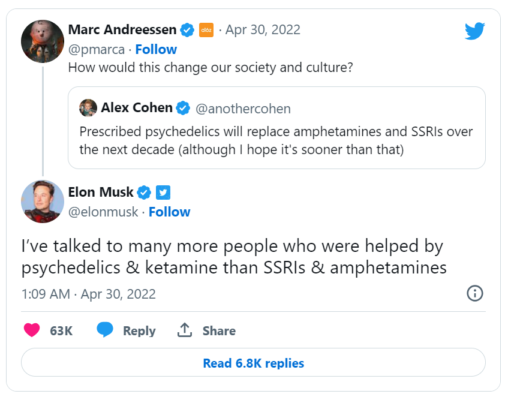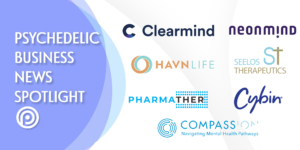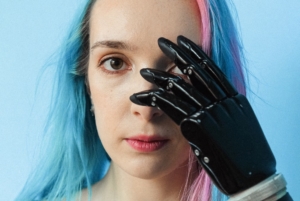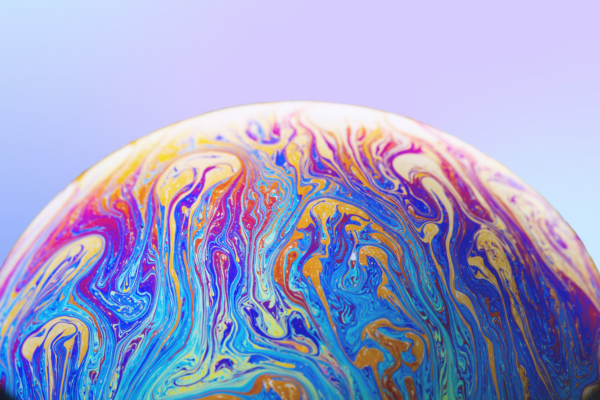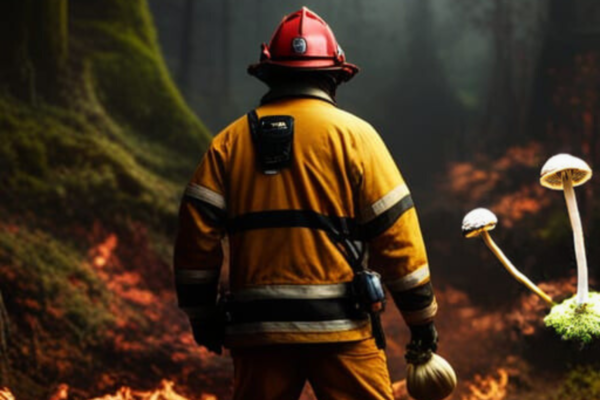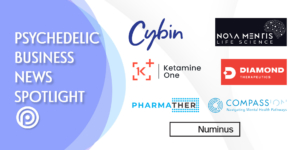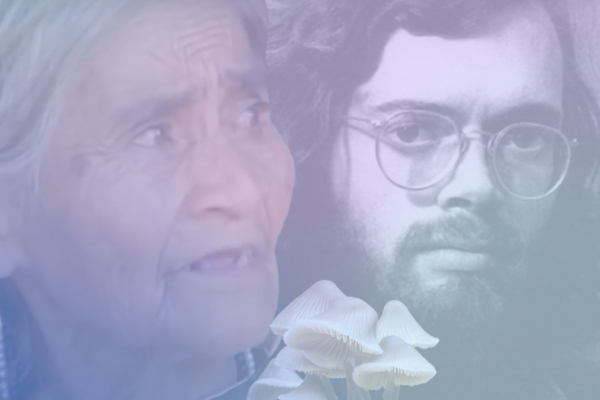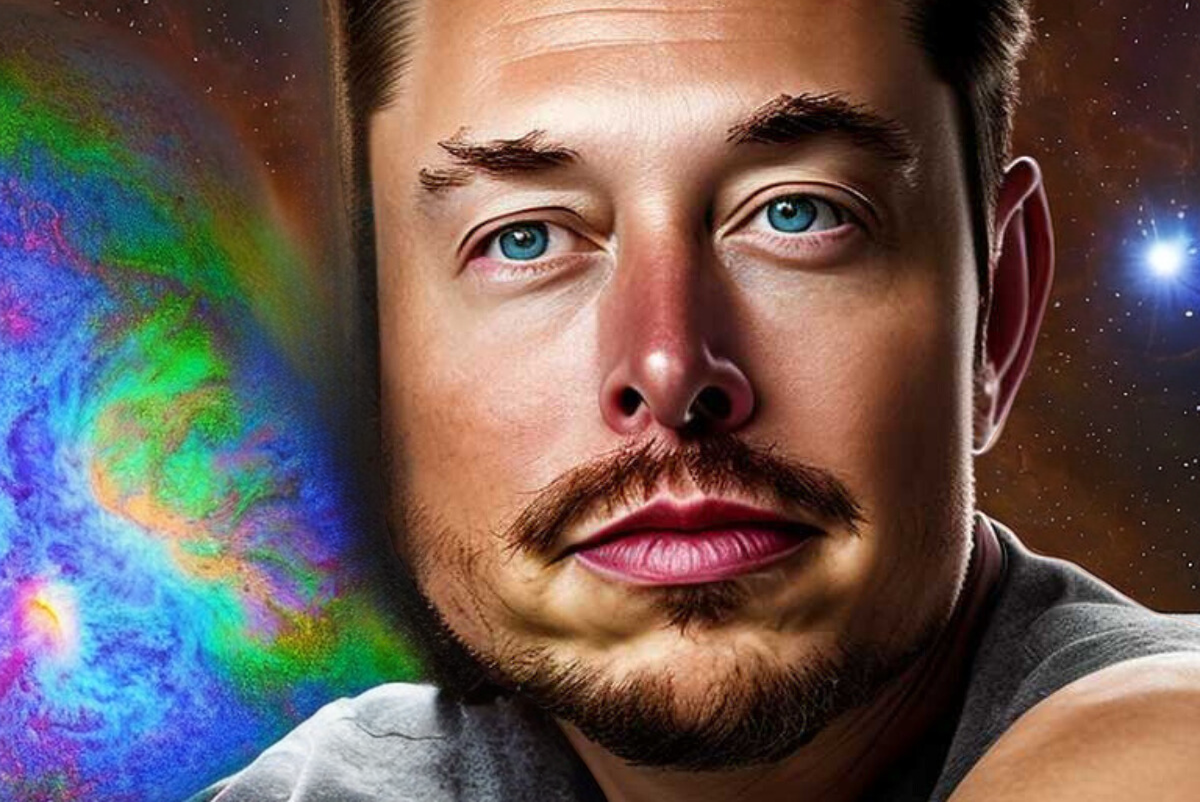
The fact that executives often take psychedelics to “turn on, tune in, and drop out” is old news. Reports that the homes of Facebook, Apple, Google, and Twitter are swimming with Type-A professionals who are actively trying to expand their minds, boost creativity, and leapfrog competition by microdosing magic mushrooms and LSD were part of what ignited the microdosing trend in the first place.
According to a report by The Wall Street Journal, Tesla and Neuralink CEO Elon Musk takes ketamine while Google founder Sergey Brin prefers psilocybin mushrooms.
According to the Journal, a few sources that remain unnamed reportedly touted that they have either witnessed or have been told by the billionaire himself that he takes small doses of ketamine to treat depression while higher doses of the dissociative were preferred for social events.
Shortly after the report, the Tesla CEO tweeted that “ketamine taken occasionally is a better option” than traditional depression treatments, citing the experience of “friends.” He also took a stance against SSRIs, which are some of the most popular pharma medications prescribed for depression. “Depression is overdiagnosed in the US, but for some people it really is a brain chemistry issue,” he wrote. “But zombifying people with SSRIs for sure happens way too much.”
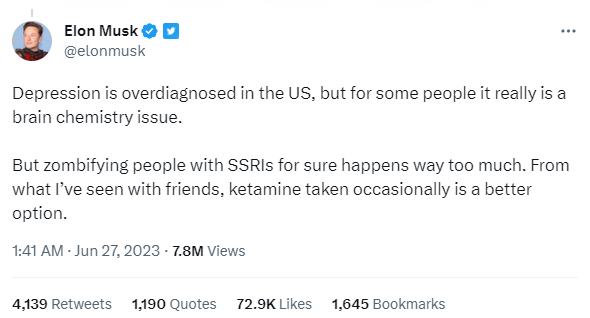
Because ketamine, when taken in large doses, can produce a psychedelic experience, drug regulators have been hesitant to approve it for depression; however, its ability to rapidly and effectively treat symptoms of depression has led many physicians and clinics to prescribe the treatment off-label. One of the most recent studies published in the New England Journal of Medicine, involving 403 patients, found that 55 percent of those who received the ketamine treatment had a sustained improvement in depressive symptoms without major side effects.
Esketamine, a ketamine derivative, was approved by the Food and Drug Administration (FDA) as medication for treatment resistant depression (TRD) in March 2019, and for major depression and suicidality in August 2020. This version is marketed as a nasal spray under the brand-name Spravato and has demonstrated an improvement of depressive symptoms only after a single dose.
Read also: New Guidance Released for Ketamine, Esketamine Therapy Use
This is not the first time that the eccentric billionaire has taken the psychedelic Twitter community by storm. Although he did not speak bluntly about his personal experiences with psychedelics, there has been speculation around Musk’s possible use of these drugs in fueling his success, with Musk tweeting several times about DMT. In 2019, he tweeted a meme about DMT and Area 51. Later on, in 2020, he also tweeted the following: “Laws of thermodynamics: 1. You can’t win. 2. You can’t break even. 3. You can’t stop playing. Unless you’re on DMT.”
Despite Musk making many cryptic pro-psychedelic comments in the past, a tweet in 2022 became one of the most explicit acknowledgments that he believes in the therapeutic power of these mind-altering substances. In response to Twitter user Marc Andreessen, who asked how prescribed psychedelics replacing amphetamines and SSRIs would change our society, the SpaceX CEO — and Technoking— replied, “I’ve talked to many more people who were helped by psychedelics & ketamine than SSRIs & amphetamines.”
Read also: Elon Musk Excites Psychedelic Industry CEOs with Tweet
The Wall Street Journal also reported that Musk is not alone among tech billionaires who rely on psychedelics to improve their lives and potentially help with business breakthroughs: Google co-founder Sergey Brin purportedly uses psilocybin mushrooms, which are now legal in Colorado and Oregon for therapeutic use and decriminalized in several cities in the United States.
You may also like: Where Are Psilocybin Mushrooms Legal or Decriminalized Around the World?
“Elon Musk coming forward right now shows what a watershed moment the Psychedelic Science 2023 conference really was, it normalized psychedelic medicine, and made it safe to talk about”, said Zappy Zapolin, award-winning filmmaker and psychedelic concierge to the stars.
“Having top athletes like Aaron Rodgers, the Democratic Governor of Colorado, and the Republican former Governor of Texas, Rick Perry, all speak enthusiastically about psychedelic medicine for mental health and addiction crises has helped to finally normalize these treatments,” said Zapolin, who’s done ibogaine work with NBA star and Kardashian-famous Lamar Odom.
During the Psychedelic Science 2023 Conference in Denver, Aaron Rodgers told an excited crowd that there have been “hundreds” of NFL players who have reached out to him about ayahuasca, seeking to learn more about his psychedelic journey with the plant medicine. The five-day event, hosted by the nonprofit Multidisciplinary Association for Psychedelic Studies (MAPS), attracted over 11,000 people–from medical professionals to politicians, celebrities, and practitioners. The event included military veterans speaking about their struggles with PTSD and researchers discussing new clinical trials examining psychedelic therapy for hospice patients, demonstrating an increasing cultural awareness and acceptance of psychedelic medicines.
“Emboldened by the media coverage of the event, Elon Musk probably felt comfortable sharing his controversial thought that ketamine is a better alternative than SSRIs,” Zappy commented. “What excites me is that both Elon Musk and Sam Altman have made it clear that the nucleus of the large AI language models they are developing will properly represent the benefits of psychedelic medicines,” he touted.
Zapolin stresses that, post-pandemic, every family—including celebrities—is battling some mental health- or addiction-related issue and “they are turning to these types of treatments, knowing now that organizations like John’s Hopkins, Yale, and MAPS have already proven their safety and efficacy”. The psychedelic concierge says that his phone “has blown up recently—and even more so since Psychedelics Science ended”. “People are looking for real solutions,” he explained.
Zappy told Psychedelic Spotlight that, lately, he’s been receiving requests not only from Silicon Valley companies but also from New York City hedge funds, Los Angeles media, and entertainment companies. “Numerous executives are now seeking group sessions to foster compassion and empathy among their teams and ensure everyone is aligned. It has become the responsibility of corporations and talent agents to prioritize the mental well-being of their employees, and clients, psychedelic medicine offers not only the possibility of improvement but also significant enhancements in this regard,” he pointed out.
We live in exciting times; once demonized in the ’60s, these substances are now slowly but surely painting a different canvas that illustrates their therapeutic potential. Australia has already changed the classification of psilocybin and MDMA to enable authorized psychiatrists to prescribe the drugs for the treatment of PTSD and depression, beginning July 1st of this year. It is only a matter of time before North America follows in the footsteps of the Land Down Under.
